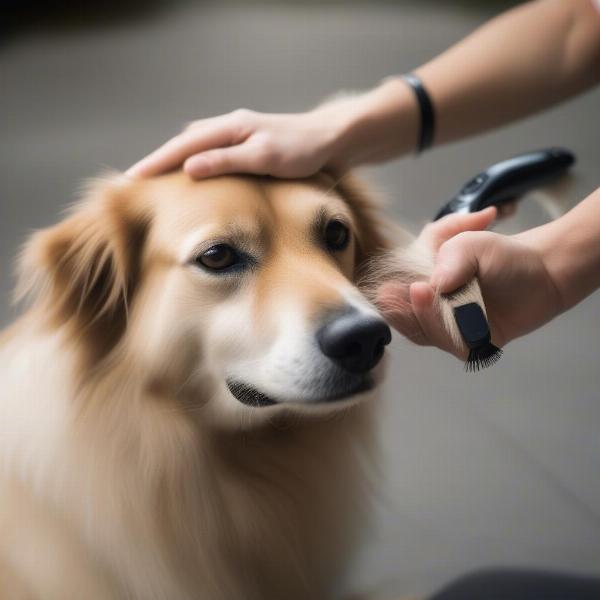Fleas are a common nuisance for dog owners, causing itching, discomfort, and even health problems. Many people wonder, can dogs get fleas from grass? The simple answer is yes. Grass, along with other outdoor environments, can harbor flea larvae and pupae, just waiting for a furry host to pass by. Understanding how dogs get fleas from grass and what you can do to protect your canine companion is essential for responsible pet ownership.
How Do Dogs Pick Up Fleas in Grassy Areas?
Fleas thrive in warm, humid environments, making grassy areas an ideal breeding ground. While adult fleas prefer to live on their hosts, flea eggs, larvae, and pupae can survive in the grass for extended periods. When your dog brushes against infested grass, these immature fleas can easily latch onto their fur and quickly develop into adults.
The Flea Life Cycle in Your Lawn
Understanding the flea life cycle is key to preventing infestations. Fleas go through four stages: egg, larva, pupa, and adult. Adult fleas lay eggs on their host, which then fall off into the environment, often landing in grassy areas. The eggs hatch into larvae, which feed on organic debris. These larvae then spin cocoons and enter the pupa stage, where they can remain dormant for months, waiting for a suitable host. This is why even seemingly flea-free lawns can harbor a hidden population of these pests.
Protecting Your Dog from Grass-Borne Fleas
Preventing flea infestations is always better than treating them. Here are some effective strategies to protect your dog from picking up fleas in the grass:
- Regular Flea and Tick Treatments: Use a veterinarian-recommended flea and tick preventative year-round, even during the colder months. These treatments come in various forms, including topical solutions, oral medications, and collars. Consult your vet to choose the most appropriate option for your dog.
- Lawn Care: Keeping your lawn short and trimmed can help reduce flea populations by eliminating their preferred habitat. Regular raking and removing debris also helps disrupt the flea life cycle.
- Avoid Flea Hotspots: Try to avoid areas known for high flea infestations, such as tall grassy fields, wooded areas, and places where other animals frequently roam.
- Regular Grooming: Frequent brushing and bathing can help remove any fleas or flea dirt that may be present on your dog’s coat.
 Dog being groomed
Dog being groomed
What to Do If Your Dog Has Fleas
If you suspect your dog has fleas, act quickly. Fleas can cause intense itching and discomfort, and in some cases, can lead to allergic reactions or transmit diseases. Consult your veterinarian for the best treatment options, which may include flea shampoos, sprays, or oral medications. You’ll also need to treat your home and yard to eliminate any remaining fleas and prevent re-infestation.
Conclusion
Can dogs get fleas from grass? Absolutely. However, by understanding how fleas thrive in grassy environments and taking proactive preventative measures, you can significantly reduce your dog’s risk of infestation and keep them happy, healthy, and itch-free.
FAQ
- How long can fleas live in grass? Flea larvae and pupae can survive in grass for several months, even through winter in some climates.
- What are the signs of fleas on my dog? Excessive scratching, biting, hair loss, and small black specks (flea dirt) on the skin are common signs of flea infestation.
- Are all flea treatments the same? No, different flea treatments have different active ingredients and methods of application. Consult your veterinarian to find the best option for your dog.
- Can humans get fleas from grass? While less common, humans can also pick up fleas from grass, especially if they spend a lot of time outdoors in infested areas.
- Besides grass, where else can dogs get fleas? Dogs can get fleas from other animals, bedding, carpets, and other environments where fleas can live and breed.
- What is the best way to prevent fleas on my dog? A combination of regular flea and tick prevention, lawn care, grooming, and avoiding flea hotspots is the most effective way to protect your dog.
- Are there natural remedies for fleas? Some natural remedies, like essential oils, are claimed to repel fleas. However, their effectiveness varies, and some can be toxic to dogs. Consult your vet before using any natural remedies.
Related Articles:
- can dogs get fleas from the grass
- itchy paw relief for dogs
- synthetic grass for dogs potty
- dog park design ideas
About ILM Dog
ILM Dog is your go-to resource for expert advice on dog breeds, health, training, nutrition, grooming, and much more. We offer a wealth of information for dog owners of all experience levels, from choosing the right breed to providing the best possible care for your furry friend. For expert guidance on all aspects of dog care, contact us via email at [email protected] or call us at +44 20-3965-8624. ILM Dog is dedicated to helping you provide a happy and healthy life for your beloved companion.